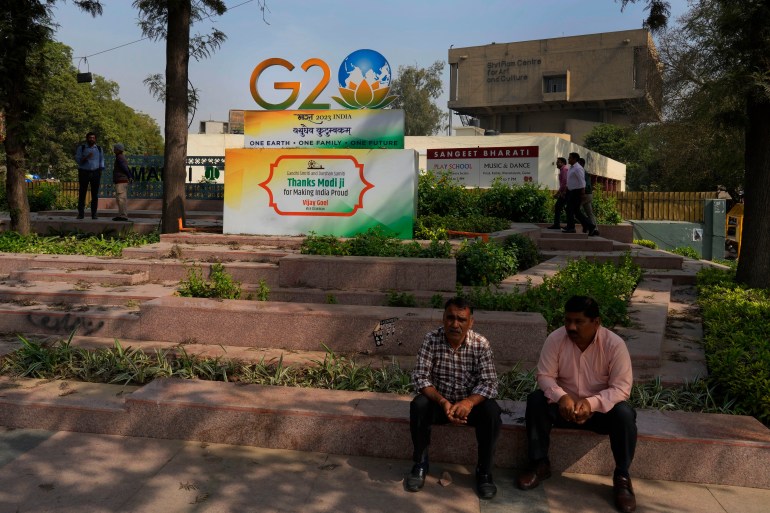Ukraine war important point of discussion at G20 meet, says India
Indian officials hope the meeting, also being held amid US-China tensions, will not overlook issues such as food security and climate change.

The Russia-Ukraine conflict will form an important part of discussions at a Group of 20 (G20) foreign ministers meeting, but host India is confident that economic challenges created by the war will get equal attention, India’s foreign secretary has said.
“Yes, given the nature and the developing situation in the Russia-Ukraine conflict, it will be an important point of discussion,” Vinay Kwatra, India’s top diplomat, told reporters on Wednesday, as foreign ministers arrived in New Delhi for the meeting.
Keep reading
list of 4 itemsG20 meeting ends without consensus over Russia’s war in Ukraine
Blinken in Central Asia to boost ties amid Russia-Ukraine war
Is Africa still ‘neutral’ a year into the Ukraine war?
“Questions relating to food, energy and fertiliser security, the impact that the conflict has on these economic challenges that we face”, among others, would also receive “due focus”, Kwatra said.
The meeting will be attended by 40 delegations including Russian Foreign Minister Sergey Lavrov, US Secretary of State Antony Blinken and Chinese Foreign Minister Qin Gang.
After a welcome dinner later on Wednesday, discussions will be held on Thursday.
G20 includes the wealthy G7 nations as well as Russia, China, India, Brazil, Australia and Saudi Arabia, among other nations, representing about 85 percent of the world’s economy and two-thirds of its population.
The event follows a meeting of finance chiefs of the bloc in Bengaluru last month, where they wrangled over condemning Russia for the war, failed to reach a consensus on a joint statement and settled instead for a summary document.
The outcome was similar to a G20 summit meeting in Bali last November, when host Indonesia also issued a final declaration acknowledging differences.
Awkward hosts
India does not want Ukraine to dominate the event, but it will be top of the agenda, said another Indian foreign ministry official on condition of anonymity because he was not authorised to speak to the media.
It is New Delhi’s “intention to continue playing the voice of the Global South and raising issues pertinent to the region,” the official added.
India – which has not condemned the war – wants its G20 presidency this year to focus on issues like alleviating poverty and climate finance, officials said.
Last week, a meeting of G20 finance ministers in Bengaluru failed to agree on a common statement after Russia and China sought to water down language on the Ukraine war.
Hosting the G20 puts India in a tricky position, because while it shares Western concerns about China it is also a major buyer of Russian arms and has ramped up oil imports.
India has not condemned the invasion, although Prime Minister Narendra Modi told Russian President Vladimir Putin last year that this was “not a time for war” in comments seen as a rebuke to Moscow.
German Chancellor Olaf Scholz on Saturday during a visit to India said he did not believe that Modi’s government “is under any illusions that this is an offensive war started by Russia in order to acquire a part of its neighbour’s territory”.
Blinken, Lavrov to attend
Top US diplomat Blinken was due in New Delhi on Wednesday alongside Russia’s Lavrov for the G20 meeting.
A meeting between the two top diplomats was seen as unlikely. The two men have not been in the same room since a G20 meeting in Bali in July when, according to Western officials, the Russian foreign minister walked out immediately after his speech and did not listen to his critics.
The two last met individually in January 2022, weeks before Russia invaded Ukraine. The two men have spoken by phone since but about other issues and not the war.
Lavrov arrived late on Tuesday in India and will use his G20 attendance to lay into the West, according to the Russian foreign ministry.
Western countries want to “take revenge for the inevitable disappearance of the levers of dominance from its hands,” the ministry’s statement said.
“The destructive policy of the US and its allies has already put the world on the brink of a disaster, provoked a rollback in socio-economic development and seriously aggravated the situation of the poorest countries,” it added.

‘Spy balloon’
Similarly in doubt on the sidelines of the G20 gathering in New Delhi was a meeting between Blinken and his Chinese counterpart Qin Gang.
Blinken had a fiery encounter with top Chinese diplomat Wang Yi last month in Germany after the US shot down a suspected Chinese spy balloon over its east coast on February 4.
The incident led Blinken to cancel a rare trip to China, slamming the “unacceptable violation of US sovereignty and international law” which “must never again occur,” the State Department said.
Beijing, which has also been angered by Washington’s stance on Taiwan, denies it uses spy balloons and says the craft was for weather research.
Wang “urged the US side to change course, acknowledge and repair the damage that its excessive use of force caused to China-US relations,” state news agency Xinhua reported.
Blinken also warned Wang against providing “material support” to Russia’s faltering war effort, as is speculated in Washington. Beijing denies any such intention.
State news agency Xinhua quoted Wang last week as saying China was willing to “strengthen strategic coordination” with Russia after meeting Lavrov and President Vladimir Putin in Moscow.
Blinken was also expected to meet on Friday his counterparts from the Quad group – Japan, Australia and India – that is seen as a bulwark against China in the Asia Pacific.